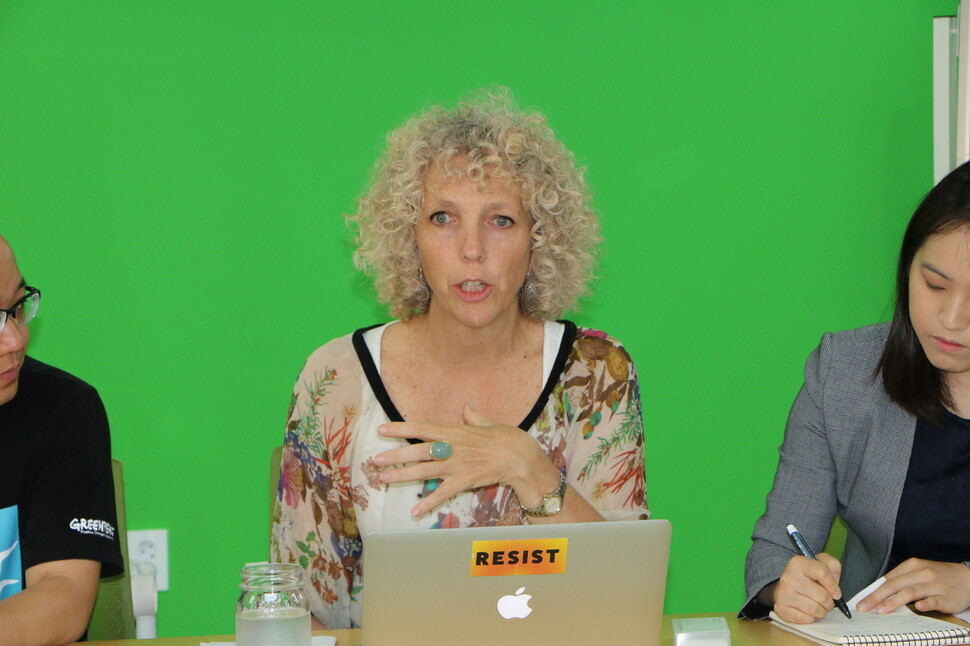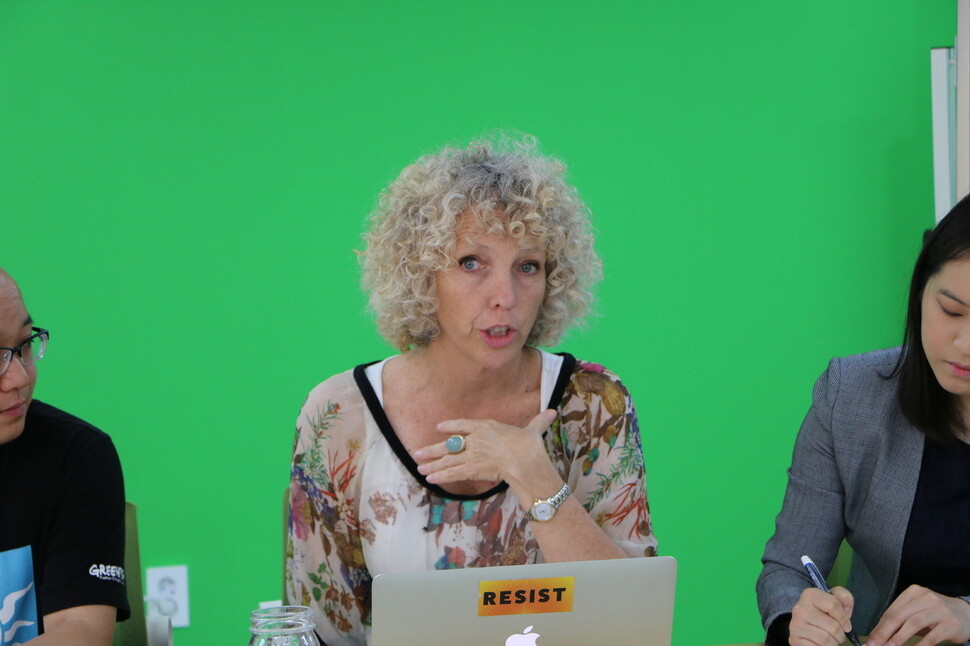hankyoreh
Links to other country sites 다른 나라 사이트 링크
[Interview] Debate on nuclear power is not technical, but about values

“I’m thrilled at how they’ve decided in South Korea to hold a public discussion on people’s health, their children, and the issues that impact them directly. That kind of approach is common around the world.”
Greenpeace International executive director Jennifer Morgan, 51, spoke to the Hankyoreh on July 12 at the organization’s office in Seoul.
“President Moon Jae-in is right. People taking part in the discussion [of nuclear power plant and energy issues] with confidence and making their voices heard is the cornerstone for the future of democracy, the country, and the Earth,” she said.
Morgan, who has been executive director for Amsterdam-based Greenpeace International since April, arrived in South Korea on the evening of July 10 to meet with major local government leaders such as Seoul Mayor Park Won-soon and Gyeonggi Gov. Nam Kyung-pil and talk about how to address the adoption of new energy approaches and environmental issues at the local government level.
Morgan addressed the controversy in the wake of the recent decision in South Korea to halt construction on nuclear power plants and leave the question of their handling up to a public opinion poll.
“The debate on the move away from nuclear power is not a technical debate by technocrats - it’s a societal debate, a debate about values,” she said.
“A good example of that is Germany’s ethics committee, where various groups of people - not nuclear power technical experts, but state representatives, ethics experts, and religious experts - took part in decision to hasten Germany’s move away from nuclear power in the wake of the Fukushima accident [in Japan],” she added.
When it was suggested that the three-month public polling period was too short, Morgan replied, “It’s not short at all.”
“The debate over nuclear power is not something new; it’s been going on for decades. Given the urgency, the important thing is to distill that past debate and effectively reflect the views of citizens and society.”

US President Donald Trump’s recent announcement of the US’s withdrawal from the Paris Climate Agreement has many now asking whether South Korea should also moderate the pace of its climate change response. On this, Morgan noted, “The other 19 countries besides the US have agreed to follow the Paris Agreement regardless of the US. Even in the US, Trump’s Paris Agreement withdrawal announcement has actually sparked a commitment toward climate change innovation and creativity by state governments and businesses.”
“We should be listening to them rather than President Trump,” she said.
“Adopting renewable energy sources isn’t a question of ‘will we’ or ‘won’t we,’ it’s a question of ‘when will it happen?’” she continued. “In that sense, we would be better off changing our mindset quickly and joining in the newly changing economy.”
Michael Shellenberger, president of the US NGO Environmental Progress, recently sent a letter to the South Korean government urging it to reexamine its policies for abandoning nuclear power.
“I know Michael personally. I was disappointed by what I heard recently,” she said.
“Michael is underestimating and minimizing the risks of nuclear power. As an American environmentalist, I think he should be focusing first on addressing issues in the US,” she added.
South Korea’s small size makes the shift to renewable energy sources a complicated one, as witnessed in the recent charges of environmental destruction and conflicts with residents over the building of wind power generation complexes around the country.
“The first thing you need to do is set clear standards for building the facilities. There’s a lesson to be learned from the German example, where the citizens were given ownership of renewable energy facilities and were able to reap the benefits from energy production,” she said.
By Kim Jeong-su, senior staff writer
Please direct questions or comments to [english@hani.co.kr]

Editorial・opinion
![[Column] Park Geun-hye déjà vu in Yoon Suk-yeol [Column] Park Geun-hye déjà vu in Yoon Suk-yeol](https://flexible.img.hani.co.kr/flexible/normal/500/300/imgdb/original/2024/0424/651713945113788.jpg) [Column] Park Geun-hye déjà vu in Yoon Suk-yeol
[Column] Park Geun-hye déjà vu in Yoon Suk-yeol![[Editorial] New weight of N. Korea’s nuclear threats makes dialogue all the more urgent [Editorial] New weight of N. Korea’s nuclear threats makes dialogue all the more urgent](https://flexible.img.hani.co.kr/flexible/normal/500/300/imgdb/original/2024/0424/7317139454662664.jpg) [Editorial] New weight of N. Korea’s nuclear threats makes dialogue all the more urgent
[Editorial] New weight of N. Korea’s nuclear threats makes dialogue all the more urgent- [Guest essay] The real reason Korea’s new right wants to dub Rhee a founding father
- [Column] ‘Choson’: Is it time we start referring to N. Korea in its own terms?
- [Editorial] Japan’s rewriting of history with Korea has gone too far
- [Column] The president’s questionable capacity for dialogue
- [Column] Are chaebol firms just pizza pies for families to divvy up as they please?
- [Column] Has Korea, too, crossed the Rubicon on China?
- [Correspondent’s column] In Japan’s alliance with US, echoes of its past alliances with UK
- [Editorial] Does Yoon think the Korean public is wrong?
Most viewed articles
- 1‘We must say no’: Seoul defense chief on Korean, USFK involvement in hypothetical Taiwan crisis
- 2Will NewJeans end up collateral damage in internal feud at K-pop juggernaut Hybe?
- 3[Column] Park Geun-hye déjà vu in Yoon Suk-yeol
- 4Why Korea shouldn’t welcome Japan’s newly beefed up defense cooperation with US
- 5Thursday to mark start of resignations by senior doctors amid standoff with government
- 6N. Korean hackers breached 10 defense contractors in South for months, police say
- 7[Guest essay] The real reason Korea’s new right wants to dub Rhee a founding father
- 8[Column] ‘Choson’: Is it time we start referring to N. Korea in its own terms?
- 9Kim Jong-un expressed ‘satisfaction’ with nuclear counterstrike drill directed at South
- 10[Editorial] New weight of N. Korea’s nuclear threats makes dialogue all the more urgent